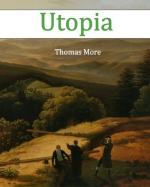|
|
Utopia Notes & Analysis
The free Utopia notes include comprehensive information and analysis to help you understand the book. These free notes consist of about 43 pages (12,709 words) and contain the following sections:
These free notes also contain Quotes and Themes & Topics on Utopia by Thomas More.
Utopia Plot Summary
Thomas More is traveling in the Low Countries when he sees his friend, Peter Giles. Giles introduces him to a well-traveled friend of his, Raphael Hythloday.
Raphael speaks of many countries and their policies and laws, and freely criticizes the laws of their own countries. When More asks him why he doesn't join the King's services as a counselor, Raphael says he is happy with his way of life. Furthermore, he does not think his services would be appreciated, as his ideas are very different from the ideas of those around him. Raphael gives an account of a meeting at Cardinal Morton's house, and then hypothesizes about what would happen if he were to express his opinion in other meetings. He then begins speaking of a country, Utopia, which he thinks is ruled very well and is a perfect country.
More begs Raphael to speak more of Utopia, and he does. He first tells of their towns, which are all as identical as possible, and have a maximum of 6,000 families. He then speaks of their magistrates, who are called Philarchs, and are chosen every year by thirty families. An Archphilarch overlooks every ten Philarchs. The Utopians' manner of life is unusual, as gold is of no value, and everything is therefore free. Also, they spend their lives in the city and in the suburbs, living in each place for two years at a time. Laws dictate that they are not to travel without a 'passport', which can only be obtained from the Prince and states where and for how long they are allowed to travel.
Slaves and marriages are spoken of next. Prisoners of war are not taken as slaves, unless they fought in the battles; women are not to be married before eighteen, and men before twenty-two. Sexual encounters before marriage are prohibited, as are polygamy and adultery. There are no lawyers in Utopia, as everybody defends himself or herself in court.
Their military discipline is such that everyone trains for the army on a daily basis, however, the Utopians prefer to hire armies rather than to let their own people go to war, and as money does not matter much to them they can do this without much discomfort. Women are encouraged to join their husbands at war.
Religion is the last topic that is spoken of, and there are many religions in Utopia, as people are free to practice whatever they believe. However, the law states that they must all believe in one Divine Being and that they are forbidden to believe that the human's soul dies with his body. Raphael speaks of the way the country and the people deal with the issues and problems associated with each of these topics, and how we could learn from them and their wisdom.
When Raphael finishes his descriptions, More has further questions and thoughts. However, he does not voice them, as it is apparent that Raphael is tired. The only thing he does say is that he wishes their governments would adapt some of Utopia's rules, but he sees little hope of this happening.




